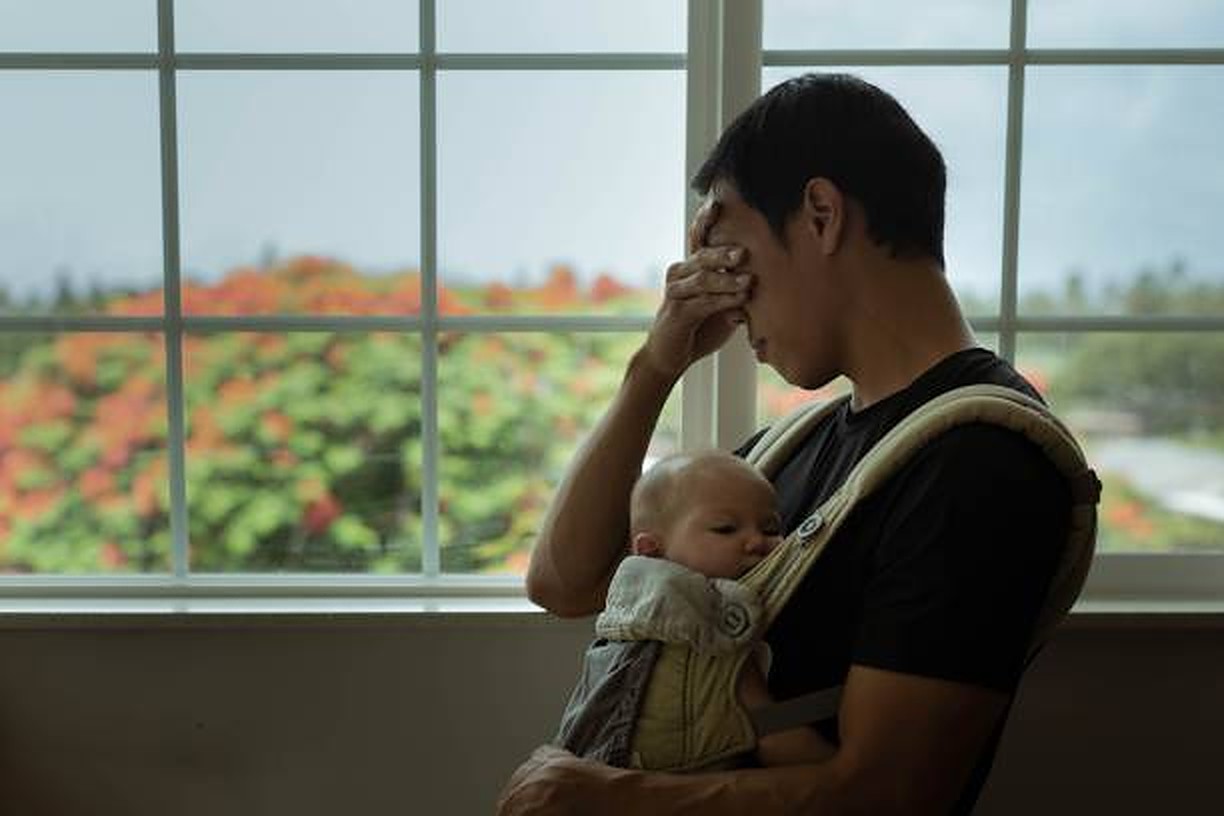It starts with detachment. Silent family dinners, prolonged absence, missed phone calls. Anxiously waiting for the doorbell to ring in the middle of the night. The sight of him sitting in the room alone in dim light, seemingly occupied with nothing at all, neither reading nor writing, nor watching television.
In the space of just an hour, he enters the house after a long day at work and heads quickly to the room to get dressed, eat, and then fall asleep. Between the two moments — the moment he appears and then disappears — there is an undefined interaction that has no label to it, nor can it be described by the language of the mind. He asks me how my day was and I answer him. He asks about my future plans and I answer him. He asks whether I’ve made up my mind about traveling and I answer him. He asks and I answer again, using the best of my ability to summarize all of my thoughts and emotions so as to not overwhelm him with more emotional baggage.
He then lays back on the couch and covers his eyes with his hand, signaling that he is now out of reach and has ended the final mission of the battle.
His existence in our home often felt like we were visited by a hummingbird; darting back and forth and alternating from one task to the next. You can only sit back and quietly watch the bird from the window before it flies on to the next house.
I did not meet my father before he became a father. I did not know who he was as a child, as a teenager, as a friend, or as a son. I did not get to meet his heart until I was born. I try to dig deep, try to reach out to him, try to see beyond his empty, tired eyes and get to know the original version of his heart before he became a father. I long to define our relationship, and attach letters together to bring meaning to the void, but after 24 years, I cannot yet grasp the meaning of fatherhood.
To value the human experience is to understand that fathers were individuals before they became fathers, and that their experience in life is not limited to the role of a breadwinner or a parent. The transition to fatherhood, and the mental health challenges that come with it, is a public health issue that has long been poorly understood and neglected.
In religion, the meaning of fatherhood is often seen through rights, duties and responsibilities, but just as there are responsibilities, there are also human experiences. There aren’t enough awareness activities by religious institutions on the individual experiences of fatherhood, and that the role is not restricted to duties and responsibilities.
As a young child, the stories of Prophet Abraham and Prophet Ya’qub (Jacob) were often told to me as though they were nothing more than religious tales that were infused with wisdom and symbolism. But today, I’ve come to also realize the human experiences in these stories.
The dialogue between Prophet Abraham and his son illustrates how much he valued the perspective and views of his child Ishmael. He questioned, listened, and talked as though he was talking to another mature individual, rather than as someone who was inexperienced, young and immature. The relationship between Prophet Ya’qub (Jacob) and his son Yusuf (Joseph) also serves as an example of the supportive relationship between the two, and how much patience Prophet Ya’qub endured with the actions of his sons; portraying a character tempered with tolerance and calmness.
Research has shown that there are three main factors that affect fathers’ mental health: the formation of the fatherhood identity, facing the competing challenges of the new fatherhood role and managing negative feelings and fears that come with it. The underlying theme behind all of these factors is the understanding that the role of the father is restricted, which often results in feelings of stress and resorting to denial or escape activities, such as excessive smoking or working longer hours.
Just as the research points out, fathers need to understand that their roles are not restricted; they need more guidance and acknowledgment from health professionals. During the perinatal period, fathers are treated as though they are ‘behind the scenes’ yet never fully included in the picture, with little to no information on pregnancy, birth, childcare, and the needs of balancing work with family responsibilities. There is definitely more that can be done by medical institutions, health professionals, and nurses to make the transition to fatherhood much easier and less stressful for new fathers.
With prices of gas, food, goods and services rapidly increasing this year, which is not met by a corresponding increase in employment or salaries, Egyptian families are bearing more financial burdens that are leading to longer working hours, extreme stress, and higher divorce rates. Egypt’s Cabinet’s Information and Decision Support Center found that Egypt’s divorce rates are among the highest in the region, with around 200,000 married couples getting divorced every year, and 40 percent ending within the first five years.
Against these contexts of economic pressures, gender stereotypes and cultural norms force Egyptian men to hide their emotions and take on the role of a tough, dependable, emotionless, and strong father. Since crying or expressing any form of vulnerability is regarded as unacceptable, or is not part of the ‘duties’ of being a father, fathers instead resort to detachment and aggressiveness in order to survive.
As I reflect over the years I had spent with my father, I cannot help but wonder why we — as young adults — often show more tolerance and compassion with a friend or a colleague of his age than our fathers. It is not just about the fear of losing our freedom and independence, which is what is commonly perceived, but it is also about the fear of the restricted role that our fathers have carried since we were born.
If I could go back in time, I would tell my father that he did not need to restrict his identity to fulfill the role of a father, nor did he need to lose himself to become the perfect father figure. The only thing he needed to do was to be himself — to live life fully as an individual and not just a parent.
Subscribe to the Egyptian Streets’ weekly newsletter! Catch up on the latest news, arts & culture headlines, exclusive features and more stories that matter, delivered straight to your inbox by clicking here.






Comments (0)